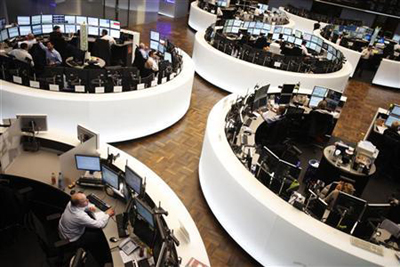Tuesday, 01 September 2015 02:17
 PARIS: Europe’s main stock markets slid Monday as investors still rattled by last week’s turmoil pondered China’s slowing economy and potential US interest rate moves.
PARIS: Europe’s main stock markets slid Monday as investors still rattled by last week’s turmoil pondered China’s slowing economy and potential US interest rate moves.
The CAC 40 in Paris shed 0.47 percent to 4,652.95 points in mid-afternoon trading, and Frankfurt’s DAX 30 gave up 0.38 percent to 10,259.46 points compared with Friday’s close.
London’s stock exchange was closed for a national holiday.
Global equities were hammered last week as risk-averse investors dumped shares amid panic that the flagging Chinese economy — the world’s second largest — could spark a new worldwide recession.
Markets took much of that back in late-week gains on encouraging US economic news.
But European stocks ended August with their worst month in four years. The DAX fell by 9.3 percent over the month, the CAC dropped by 8.5 percent and the FTSE 100 in London shed 6.7 percent.
Lingering concerns about China and comments over the weekend by US Federal Reserve officials left analysts Monday split over whether the US Federal Reserve would raise interest rates for the first time since 2006 next month.
In a speech at a conference on monetary policy in Jackson Hole, Wyoming, the Fed’s number two Stanley Fischer said: “We should not wait until inflation is back to two percent to begin tightening.”
He added, however, that the Fed needed to “consider the overall state of the US economy as well as the influence of foreign economies on the US economy as we reach our judgement on whether and how to change monetary policy.”
Interpretation of Fischer’s comments varied greatly.
“Despite the recent market turbulence, it would appear that an interest rate increase in September still remains on the cards. It continues to depend on the strength of incoming economic data, of which the (US) employment report at the end of this week is the most important,” said Juliet Tennent, an economist with brokerage Goodbody of an official jobs report due on Friday.
But financial services company Cantor Fitzgerald in a note insisted “a move in September is firmly off the table given recent volatility… (we) believe December at the very earliest is more likely at present.”
US stocks fell modestly in Monday trade, after surviving last week’s extreme China-driven turmoil with net gains.
The Dow Jones Industrial Average was down 0.27 percent to 16,597.54 points in early afternoon trade in New York, while the S&P 500 lost 0.29 percent to 1,983.12, and the Nasdaq Composite gave up 0.16 percent to 4,820.65.
Nervousness still pervaded Wall Street after last week’s roller-coaster trade, and as some analysts continued to argue that US equities are generally overvalued.
Over the weekend Nobel economics laureate Robert Shiller, known for his sober analyses of market trends, wrote in The New York Times that based on price-to-earnings ratios, US markets are priced well above the long-term average despite the losses of recent weeks.
Shiller did not predict more losses but noted that at the moment the stock market “is inherently risky because of unstable investor psychology.”
The issue of the US rate rise is of importance to markets beyond what the move would say about the improving US economy.
The historically low US interest rates of recent years have fuelled investment in global stock markets because they have made it cheap to borrow money for speculation.
A rise would likely tamp down that appetite, and continue pulling investment out of slowing emerging economies and back into dollar-denominated US options yielding higher returns.
The continuing suspense over rates helped lift the euro to $ 1.1216 on Monday from $ 1.1188 late Friday.
Asian markets were mostly dragged lower Monday by Shanghai resuming last week’s decline to finish down by 0.82 percent. Tokyo stocks fell 1.28 percent while Sydney lost 1.07 percent.
“Markets have opened the week on a fairly bearish note, with China seemingly at the heart of the concern again,” said IG Markets chief market strategist Chris Weston, who also pointed to Fischer’s comments for the jitters.
“Have markets opened on a negative footing because he caused another twist in the ‘will they hike in September’ question?… It seems like we simply need a reason to panic these days.”



























